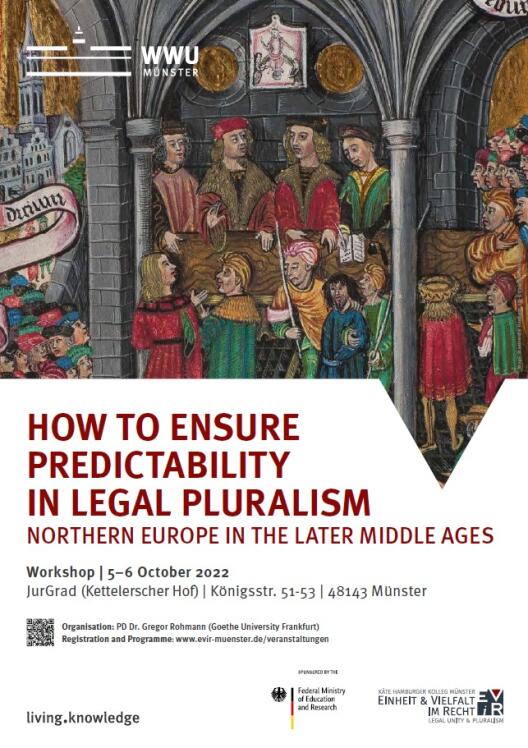How to Ensure Predictability in Legal Pluralism. Northern Europe in the Later Middle Ages

Workshop
Wednesday, 5 October 2022 to Thursday, 6 October 2022
Venue:
JurGrad (Kettelerscher Hof)
Königsstr. 51-53
48143 Münster
Registration:
Organisation:
PD Dr. Gregor Rohmann (Goethe-Universität Frankfurt)
g.rohmann@em.uni-frankfurt.de
Concept:
In spheres of legal pluralism, there are always overlapping normative framings to be negotiated in order to fulfil expectations. So, how do people decide according to which framing they should act? How do actors provide for predictability? How do people cope with non-compliance?
Economic historians of the later Middle Ages have stressed the impact of honour and trust as basic mechanisms of producing predictability between merchants. Simultaneously, merchants needed stable political preconditions, as provided for by the mutual privileges their authorities agreed upon. On this political level as well as in everyday life, the threat and – if needed – use of force were eminent options. Hence, violence was not socially disruptive, but functional, as long as a relative equality of military means and the overwhelming consensus of economic exchange enclosed it. Within repetitive communication framed by these factors, norms emerged, which were used to produce and reproduce predictability. However, these norms always remained subject to continual re-negotiation.
All this the actors did not do in order to overcome legal pluralism, but in order to improve their own position and/or the position of their respective group in heterogenous legal spaces. These spaces thus remained pluralistic, because any harmonization necessarily failed, due to the diverging interests of the actors involved. The workshop aims at discussing these questions referring to late medieval Northern and Central Europe as an example.
Programme:
Wednesday, 5 October 2022
14.00–14.30
Peter Oestmann (Münster) | Welcome
Gregor Rohmann (Frankfurt) | Introduction
Session 1: Merchants and Markets in Central Europe
Chair: Leslie Carr-Riegel (Budapest/Münster)
14.30–15.15
Katalin Szende (Budapest) | Trust and Distrust in the Legal Framework of Urban Life in Late Medieval Hungary
15.15–16.00
Olga Kozubska (Lviv/Münster) | Trading Privileges and Legal Pluralism in Ukrainian Towns
16.00–16.30 | Coffee break
Session 2: Scandinavia and the North
Chair: Vera Teske (Münster)
16.30–17.15
Tobias Boestad (La Rochelle) | German Law or Law of the Germans? Some Notes about the Early Hanse Merchants and their Attitude towards Legal „Harmonization“ in Northern Europe
17.15–18.00
Louis Sicking (Amsterdam/Leiden) | A Microcosm of the Hanse? Legal Pluralism at Scania, 1350-1550
18.00–18.45
Edda Frankot (Bodø) | Administering Justice to Foreigners: International Merchants and Mariners before the Late Medieval Aberdeen Courts
19.30 | Dinner
Thursday, 6 October 2022
Session 3: Hanse Towns and Hanse Merchants
Chair: Sophia Mösch (Münster)
9.00–9.45
Ulla Kypta (Hamburg) | Bridging Social Capital: Predictability as the Basis of Cooperation between Late Medieval Merchants
9.45–10.30
Philipp Höhn (Halle) | Legal Commonalities in Legal Pluralism. Communicating Conflict and Cohesion in Hanse Towns
10.30–11.00 | Coffee break
11.00–11.45
Justyna Wubs-Mrozewicz (Amsterdam) | The Trouble with Legal Pluralism: a Danzig Case
Session 4: The Hanse in the West
Chair: Quentin Verreycken (Louvain)
11.45–12.30
Bart Lambert/Juuriaan Wink (Brussels) | Legal Pluralism and the Hanseatic Zuiderzee Towns: Conflict Management in a Multilayered Legal Landscape between North and Baltic Seas
12.30–14.00 | Lunch break
14.00–14.45
Indravati Félicité (La Réunion) | Considerations of Legal Unity and Pluralism in Early Modern Hanse Diplomacy
14.45–15.00
Peter Oestmann (Münster) | Commentary
15.00–15.30 | Final discussion

